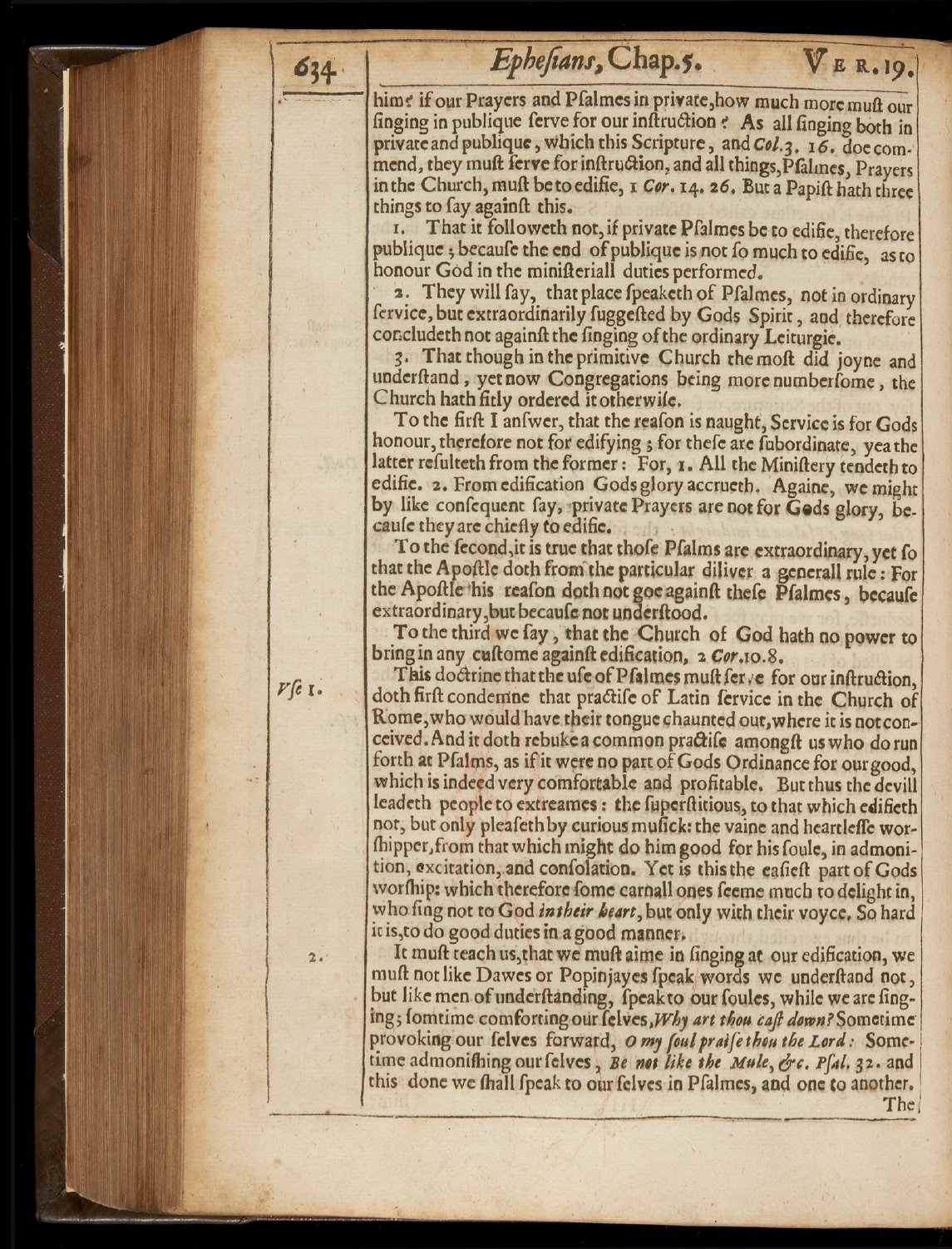

634
Ephefian.r,
Chap.5.
j?
E
R19
himf
if
our Prayers and Pfalmes
in
private,how
much more
muft our
tinging
in
publique ferve for
our
inftruélion
e
As
all finging
both
in
private
and
publique ,
which
this
Scripture , andCol.3. 16.
doecom
mend, theymuft ferve forinftruftion,
and all
things,Pfalmes,
Prayers
in
the
Church,
muft be
to
edifie,
r
Cor.
Li..
26.
But
a
Papift
hath
three
things
to
fay
againft this.
r.
That
it
followcth not,
if private
Pfalmes be to
edifie,
therefore
publique
;
becaufe
the
end
of
publique
is
not
fo
much to
edifie, as
to
honour
God
in
the miniferiall
duties
performed.
z. They
will fay,
that
place fpeaketh
of
Pfalmes, not
in
ordinary
fervice,
but extraordinarily
fuggeffed by
Gods
Spirit
,
and therefore
concludeth not againftthe
finging
of
the ordinary Leiturgie.
3.
That though
in
the
primitive
Church the
moft
did joyne
and
underhand
,
yet now Congregations being more numberfome
,
the
Church
hath
fitly ordered
it
other
wife.
To
the
firft
I
anfwer,
that the
reafon
is
naught,
Service
is
for Gods
honour, therefore not
for edifying
;
for thefe arc fubordinate, yea the
latter refulteth from
the former
:
For,
r.
All
the Miniftery tendeth to
edifie. z. From edification Gods
glory accrueth.
Againe, we might
by
like
confcquenr fay, private Prayers are not for
Gads
glory,
be-
caufe
they
are
chiefly
to
edifie.
To
the fecond,it
is
true
that thofe
Pfalms are extraordinary, yet
fo
that the Apoftle doth from the particular
diliver a generali rule
:
For
the Apofflc
his
reafon
doth
not goe againft
theft Pfalmes,
becaufe
extraordinary,but
becaufe
not underftood.
To
the third
we fay
,
that
the
Church of God
bath no power
to
bring
in
any
cuftome
againft edification, z Cor.ro.8.
This
doârine
thatthe
ufeofPfalmes
mutt
fer
.e
for ourinftru
&ion,
Yfe
t.
doth
firft
condemne
that
praElife
of
Latin fervice
in
the
Church of
Rome,who
would
have
their
tongue chaunted
out,where
it is
not
con-
ceived. And
it
doth
rebuke
a
common praâife amongft
us
who
do
run
forth
at
Pfalms,
as
if
it
were no part
of
Gods Ordinance
for ourgood,
which
is
indeed very
comfortable
and
profitable.
But thus the devill
leadeth people
to
extreames
:
the
fuperftitious,
to
that
which
edifieth
nor, but only
pleafethby
curious mufick:
the
vaine and heardcffe
wor-
fhipper,from that which
might do
him
good for
his foule,
in
admoni-
tion, excitation,
and
confolation. Yet
is
this the
eafieft
part
of
Gods
worfhip:
which therefore fome
carnali ones feeme much
to
delight
in,
who
fing
not to
God in their
heart,
but
only with their voycc.
So
hard
it
is,to do
good
duties
in a
good
manner.
It mutt teach us,that we mutt aime
in
tinging at our edification, we
mutt not
like
Dawes
or Popinjayes
fpcak
words we
underhand
not,
but like men
of
underftanding, fpeakto our
foules, while
we
are
fing-
ing; (omtime comforting
our felves,Why
art
thou
cafldawn
?Sometime
provoking our
felves
forward,
o
my
foulpraife
thou the
Lard
:
Some
-
time admonifhing
ourfelves,
Be
net like the Mule,
6.e.
Ppd.
32.
and
this done we
(hall fpcak
to our
felves
in
Pfalmes, and
one
to
another.
The;

















